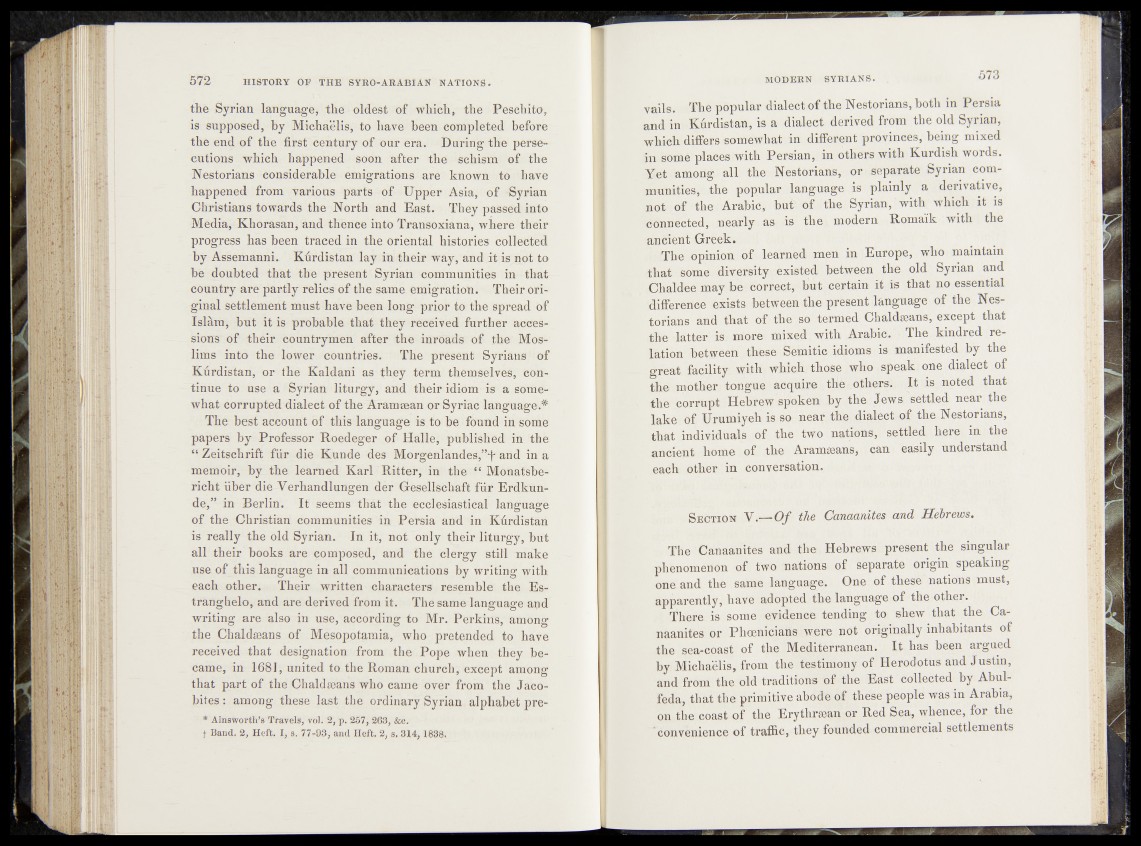
the Syrian language, the oldest* of Which, the Pesëhito,
is supposed, by Michaelis,- to have been completed before
the end of the first century of Our era. During the persecutions
which happened^sodn after the schism of the
Nestorians considerable- emigrations are known rté have
happened from various parts of Upper Asia,?'of “Syrian
Christians towards the North and East. They passed into
Media, Khorasan* and thence into Transoxiana, where their
progress has been traced in the oriental histories collected
by Assemanni. Kórdistan lay in their way, and it is n df to
be doubted that the present'Syrian communities in that
country are partly relics-of the same emigration Their original
settlement must have been long prior to the spread Of
Islam, but it is probable that they received further accessions”
of their countrymen after the inroads of the Moslims
into the lower countries. The present Syrians of
Kurdistan, or the Kaldani as they term thëmS^Lves1; 'continue
to use a Syrian liturgy, and their idiom- is a somewhat
corrupted dialect of the Aram man or Syriac language.*
The best account of this language is to be found in some
papers by Professor Roedeger of Halle; ^published in 4|he
“ Zeitschrift für die Kunde des Morgenlandes*”1! arid- ö#a
memoir, by the learned Karl Ritter, inr tbë?/‘ Monatsbericht
über die Verhandlungen der Gesellschaft für Erdkunde,”
in Berlin. It seems that the ecclesiastical language
of the Christian communities in Persia and in Kurdistan
is really the old Syrian. In it, not only ^heir liturgy, but
all their books are composed, and the clergy still make
use of this language in all communications by writing with
each other. Their written characters resemble the Es-
tranghelo, and are derived from it. The same language and
writing are also in use, according to Mr. Perkins, among
the Chaldasans of Mesopotamia, who pretended to have
received that designation from the Pope when they became,
in 1681, united to.the Roman church, except among
that part of the Chaldaeans who came over from the Jacobites
: among these last the ordinary Syrian alphabet pre-
* Ainsworth’s Travels, vol. 2, p. 257,203, &c.
f Band. 2, Heft. I, s, 77r93, and Heft, 2, a, 314,1838,
vails. rThe popular dialect of the Nestorians, both in Persia
and in Kurdistan, is a dialect-,,derived from the old Syrian,
which differs somewhat in different provinces, being mixed
in*'s o m e places-with Persian, in others with Kurdish words.
Yet among (all the Nestorians, or is^parate Syrian communities,
the popular language is plainly a derivative,
not}of the Arabiri,-d«of^the,-Syrian, with which it is
connected, nearly;, as .-is the.i moffefni^ Romaik with the
anciej§l Greek. ^ _
The opinion ^$hiearned- men in Europe, who -maintain
that some - diversity yex-i-st^f between the old : Syrian and
Chaldee may,be - correct, but certain it>is that no essential
;differenee' eMstsit,feeitwe^xtlier*'pBresent language of the Nes^
ptbrians and that- -of tV e ^ except that
th-e latter' is more mixed; with Arabia.. f^diei kindred relation
between these^einitic idioms,as manif^edgby the
great facility with which, thqse .who ,spea]su one dialect’of
the mother tongue- acquire , tire .others:-* It -is. noted that
the corrupt Hebrew'spoken, by the Jewsb-settled near the
lake! cff Urumiyeh is so near the. dialect of the.Nestorians,
that individuals ipf;, the two nations, settled here* in the
ancient home of the- Aramaeans* • can easily understand
each other in conversation.
Section V.*—- O f th e Cd'fictcLnitQS c in d H c b T ^ w s ,
The Canaanites and the Hebrews present the singular
phenomenon of two nations of separate origin speaking
one and the same language. One of these nations must,
apparently, have adopted; the language.bf the.-oth.eif.
There is some evidence tending to shew that, the Cay
naanites or Phmnipians were not origipajly inhabitants of
the sea-coast of the Mediterranean. . It has been argued
by Michaelis, from the testimony of Herodotus and Justin,
and from the old traditions of the -East collected by Abul-
feda, that the primitive abode of these people was in Arabia,
on the coast of the Erythraean,qr Red Sea, whence, for the
"convenience of traffic, they founded commercial settlements